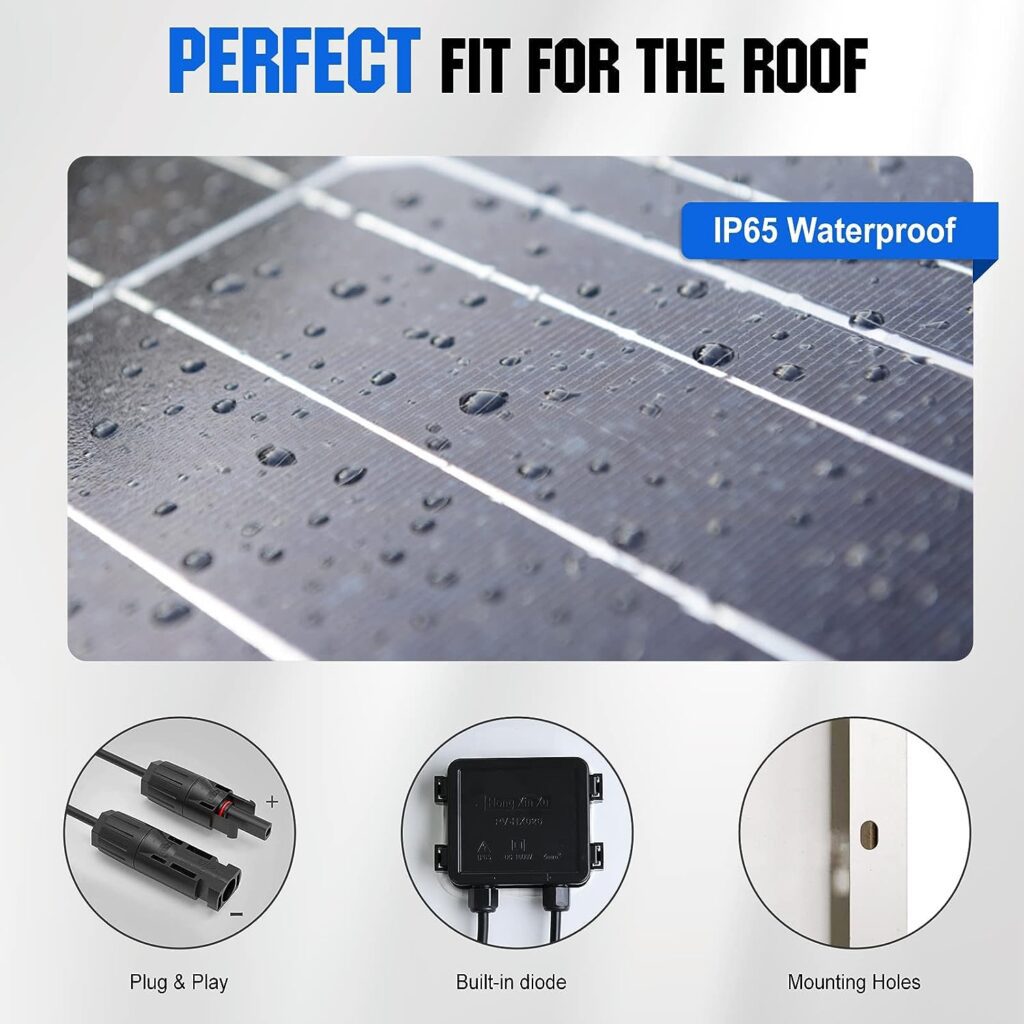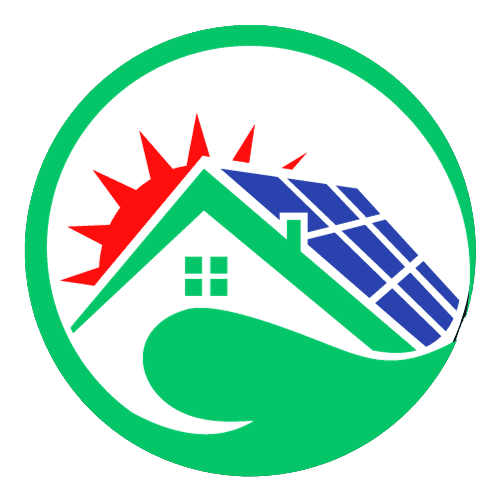Solar Panels Work On Cloudy Days But will still produce electricity during cloudy weather, but not at their peak performance.

Credit: Amazon
Understanding Solar Panel Technology
Solar panels can still work on cloudy days, although their efficiency may be reduced. While direct sunlight is most effective, panels can still generate power using indirect sunlight or light reflected through clouds. Rain can actually help by washing away dirt and dust, improving their performance.
Basics Of Photovoltaic Cells And Their Function
Photovoltaic cells, often known as solar cells, are the foundation of solar panels. These cells are in charge of turning sunlight into energy via a process known as the photovoltaic effect. Photovoltaic cells are made up of two layers of semiconductors, which are typically silicon. The top layer has a negative charge, while the bottom layer has a positive charge.
The Role Of Sunlight In Electricity Generation
Sunlight plays a crucial role in the electricity generation process of solar panels. When sunlight hits the photovoltaic cells, it excites the electrons in the silicon atoms, causing them to move from the negatively charged layer to the positively charged layer. This movement creates an electric current, which can be harnessed as usable electricity.
Types Of Solar Panels And Their Efficiency Rates
There are different types of solar panels available, each with varying efficiency rates. Understanding these types can help you make an informed decision when installing solar panels.
| Type of Solar Panel | Efficiency Rate |
|---|---|
| Monocrystalline | High (around 15-20%) |
| Polycrystalline | Moderate (around 13-16%) |
| Thin-Film | Low (around 10-12%) |
Monocrystalline solar panels are made from a single crystal structure and are known to offer the highest efficiency rates. Polycrystalline solar panels are made from multiple crystals, which results in slightly lower efficiency. In contrast, thin-film solar panels are created by depositing a thin layer of photovoltaic material onto a substrate.
While they offer lower efficiency, they can be more cost-effective and suitable for certain applications.
It’s important to note that the efficiency of solar panels may vary depending on environmental factors, including sunlight intensity and temperature. However, even on cloudy days, solar panels can still generate electricity, although at a lower efficiency compared to bright, sunny days.
Do Solar Panels Work On Cloudy Days
One common concern that homeowners have when considering solar panels is whether they will still produce energy on cloudy days. After all, solar panels depend on sunshine to create power. In this article, we will explore the impact of cloud cover on energy production, the degrees of cloudiness and solar energy capture, and the influence of diffuse and direct sunlight on output.
The Effect Of Cloud Cover On Energy Production
Cloud cover can have a significant impact on the amount of energy that solar panels can generate. When the sky is overcast, sunlight is scattered and diffused, leading to a decrease in the intensity of light that reaches the solar panels. As a result, the energy production of solar panels is reduced compared to sunny days.
Degrees Of Cloudiness And Solar Energy Capture
The degree of cloudiness also plays a role in the amount of solar energy that can be captured by panels. On partially cloudy days, where the sky is not completely covered in clouds, solar panels can still capture a significant amount of sunlight. However, during heavy cloud cover or thick clouds, the amount of sunlight reaching the solar panels is further reduced, resulting in lower energy production.
Impact Of Diffuse And Direct Sunlight On Output
Solar panels can still generate electricity on cloudy days because they can utilize both direct and diffuse sunlight. Direct sunlight refers to the light that reaches the panels without obstruction, while diffuse sunlight refers to the scattered light that is reflected by clouds. Although the energy output from solar panels is lower on cloudy days, they can still convert both direct and diffuse sunlight into electricity.
It is important to note that the efficiency of solar panels can vary depending on the technology used. Some panels are specifically designed to capture and convert diffuse sunlight more efficiently, making them better suited for regions with higher cloud cover.
In conclusion, solar panels do work on cloudy days, although their energy production is lower compared to sunny days. The impact of cloud cover, degrees of cloudiness, and the ability of solar panels to capture both direct and diffuse sunlight all contribute to their performance in cloudy conditions. If you are considering installing solar panels, it’s important to assess the average amount of sunlight in your region and choose a system that is optimized for your specific conditions.

Credit: Youtube
Measuring Energy Output Variance
Solar panels can still generate electricity on cloudy days, although not at their peak performance. The efficiency of solar panels depends on the level of cloud coverage. However, rain can actually help to keep the panels operating efficiently by washing away any dust or dirt.
Tools For Tracking Solar Panel Performance
There are several tools available for tracking the performance of solar panels to measure energy output variance. These tools provide valuable data that can help you evaluate the effectiveness of your solar system on both sunny and cloudy days.
How To Interpret Data From Cloudy Vs. Sunny Days
Interpreting the data from cloudy and sunny days can give you insights into how your solar panels perform in different weather conditions.
- On sunny days, solar panels receive direct sunlight, resulting in higher energy production. The data will show higher energy output during these days.
- On cloudy days, solar panels still generate electricity, although at a lower rate compared to sunny days. The data will reflect this lower energy output.
- By comparing the data from both types of days, you can determine the energy variance and evaluate the overall efficiency of your solar system.
Seasonal Performance Trends For Solar Panels
Solar panels’ performance can also vary seasonally due to factors such as sunlight intensity, temperature, and daylight hours. It is essential to monitor these seasonal trends to optimize the output of your solar system throughout the year. Here are some key considerations:
- In summer, when days are longer and sunlight is more intense, solar panels tend to produce higher energy output.
- In winter, shorter days and lower sunlight intensity can result in lower energy production.
- Spring and autumn fall in between, with moderate sunlight and energy production levels.
- Monitoring the seasonal performance trends allows you to make adjustments and optimize the energy output of your solar panels accordingly.
By utilizing the right tools for tracking solar panel performance, interpreting data from various weather conditions, and understanding seasonal performance trends, you can gain valuable insights into the efficiency of your solar system. This knowledge can help you optimize energy production and make informed decisions about your solar energy setup.


Credit: Amazon
Strategies For Improved Efficiency
Solar panels are well-known for producing power from sunshine. However, many people wonder whether they work efficiently on cloudy days. The good news is that solar panels can still produce electricity even when there is cloud cover. In this blog post, we will discuss some strategies to improve the efficiency of solar panels on cloudy days. By implementing these strategies, you can enhance the performance of your solar panel system and maximize energy production.
Technological Advancements For Low-light Conditions
With technological advancements, solar panel manufacturers have developed innovative solutions to improve the performance of solar panels in low-light conditions. These advancements include the use of amorphous silicon, which allows solar panels to capture sunlight even in overcast weather. Additionally, some panels have bypass diodes that counter the negative effect of shading caused by clouds. These innovations ensure that solar panels can still generate electricity even on cloudy days, albeit at a slightly reduced efficiency compared to bright sunny days.
Tips For Optimizing Solar Panel Placement And Angle
The placement and angle of your solar panels play a crucial role in maximizing their efficiency on cloudy days. Here are some tips to optimize their positioning:
- Install solar panels in areas with minimal shading: Choose a location with minimal obstructions such as trees or buildings that may cast shadows on your panels. This will enable them to receive the most sunlight possible.
- Adjust the tilt angle: Tilting your solar panels at an optimal angle based on your geographical location helps to capture as much sunlight as possible. By aligning the panels properly, you can ensure that they receive the maximum amount of sunlight, even during cloudy weather.
- Consider using solar trackers: Solar trackers automatically adjust the position of your panels to follow the sun’s movement during the day. This helps to optimize sunlight absorption, increasing the efficiency of your panels, especially on cloudy days.
Importance Of Regular Maintenance And Cleaning
Maintaining and cleaning your solar panels regularly is essential for maximizing their efficiency, especially on cloudy days. Here’s why:
- Remove dirt and debris: Over time, dust, leaves, and other debris can accumulate on the surface of your solar panels, reducing their ability to absorb sunlight. Regularly cleaning them with a soft brush or a gentle spray of water can help maximize their efficiency.
- Check for shade-causing objects: Inspect your surrounding environment for any new objects, such as tall plants or structures, that may create shade on your panels. Eliminating these shade-causing objects will ensure the panels receive uninterrupted sunlight.
- Monitor for damage or defects: Regularly inspect your panels for any signs of damage or defects, such as cracks or loose connections. Detecting and addressing these issues early on can optimize the performance of your solar panel system, even during cloudy weather.
By following these strategies for improved efficiency, you can harness the maximum potential of your solar panel system, even on cloudy days. Remember, while sunlight is essential for optimal energy production, modern solar panel technologies and proper maintenance can ensure that your panels continue to generate electricity even in low-light conditions.
Solar Panels During Weather Events
On gloomy days, solar panels may still produce power, however their efficiency may be lowered. While they are most effective in direct sunlight, they can still produce power when the light is reflected or partially blocked by clouds. Rain can even help by washing away any dust or dirt on the panels.
Comparative Performance During Various Weather Types
Photovoltaic panels may produce electricity from either direct or indirect sunlight, although they are more effective under direct sunlight. It’s a common myth that solar panels don’t work on cloudy days or during weather events. However, solar panels will still work even when the light is reflected or partially blocked by clouds. While their performance may be reduced, they can still generate electricity during cloudy weather.
Rain actually helps to keep your panels operating efficiently by washing away any dust or dirt that may have accumulated on the surface. This allows more sunlight to reach the panels, maximizing their potential. So, even on rainy days, solar panels can still contribute to your energy production.
It’s important to note that the amount of electricity generated during cloudy weather will depend on the intensity of the cloud cover and the specific characteristics of your solar panel system. In general, high-quality solar panels with advanced technology and higher efficiency ratings will perform better in less optimal conditions, such as cloudy days or weather events.
Solar Panel Resilience And Hail, Rain, Or Snow
Solar panels are designed to withstand various weather conditions, including hail, rain, and snow. They are built to be durable and resistant to damage. The materials used in the construction of solar panels, such as tempered glass and sturdy frames, ensure that they can withstand the impact of hailstones.
Rain and snow are also not a cause for concern. Solar panels are designed with a slope to allow water to run off easily, preventing water accumulation that could potentially damage the panels. Snow, although it may temporarily cover the panels, will eventually melt and slide off once the sunlight returns, allowing the panels to resume their normal operation.
Backup Solutions For Energy During Prolonged Overcast Periods
While solar panels can still produce electricity on cloudy days, prolonged overcast periods may significantly affect their performance. In such cases, it is important to have backup solutions to ensure a continuous supply of energy.
One popular backup solution is the use of battery storage systems. These systems allow excess energy generated by solar panels to be stored in batteries, which can then be used during times when there isn’t enough sunlight. This ensures that you have a reliable source of energy even during prolonged overcast periods.
Another option is to connect your solar panel system to the grid. In this setup, any excess energy generated by your panels can be fed back into the grid, and you can draw electricity from the grid when your panels aren’t producing enough power. This way, you can still access electricity even when your solar panels are not operating at their full capacity.
FAQs On Do Solar Panels Work On Cloudy Days
How Efficient Is A Solar Panel On A Cloudy Day?
On gloomy days, solar panels may still produce power, however their efficiency may be lower than on bright days. They can utilize both direct and indirect sunlight to produce power. Clouds can partially block the light, but panels can still work by using the reflected or diffused sunlight.
Rain also helps to clean the panels, ensuring their optimal operation.
Do I Still Get Solar Power On A Cloudy Rainy Day?
Yes, solar panels can still generate power on a cloudy rainy day. They can use direct or indirect sunlight to produce electricity, although they are most effective in direct sunlight. Even when the light is reflected or partially blocked by clouds, solar panels will still work.
In fact, rain can help improve their efficiency by washing away dust and dirt.
Do Solar Panels Work If There Is No Sun?
Solar panels will still work on cloudy days, although not at their peak efficiency. They can use indirect sunlight to generate power, even when the light is reflected or partially blocked by clouds. Rain can actually help clean the panels and improve their efficiency by washing away dust or dirt.
How Much Will A 100 Watt Solar Panel Output On A Cloudy Day?
Solar panels will still work on cloudy days, although not at their peak performance. Their effectiveness is determined on the extent of cloud covering.
Conclusion
Solar panels are often associated with sunny days and abundant sunlight. They can, however, produce power even on overcast days. While their efficiency may not be at its peak, solar panels can still harness the diffuse sunlight and produce power.
In fact, rain helps by washing away any dirt or dust that may have accumulated on the panels. So, even on cloudy days, solar panels continue to work and contribute to your renewable energy goals.

